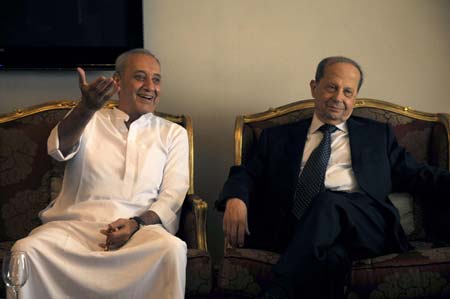 An old enmity between the Lebanese president and parliament speaker is fuelling a political row that threatens to paralyze government and inflame sectarian tension in the run-up to elections in May.
An old enmity between the Lebanese president and parliament speaker is fuelling a political row that threatens to paralyze government and inflame sectarian tension in the run-up to elections in May.
The dispute between President Michel Aoun, a Christian, and the Shi‘ite Parliament Speaker Nabih Berri reflects personal hostility dating to the 1975-90 civil war. It also touches on the balance of power between their sects in a system that shares out government participation according to religious sect.
The tension reached boiling point on Monday as footage of Aoun’s son-in-law, Foreign Minister Gebran Bassil, calling Berri “a thug” was circulated on social media.
Berri’s camp reacted with fury, saying Bassil had crossed “red lines”. Supporters of Berri from the Amal movement he has led for decades protested by setting tyres ablaze in Beirut.
Gunfire was heard as Berri supporters gathered in a protest near offices of Aoun’s Free Patriotic Movement (FPM) in Jdeideh, a Christian area east of Beirut, drawing soldiers to the area to guard against further trouble, security sources said.
The crisis has spiraled since December when Aoun signed a decree promoting dozens of army officers without the signature of Shi‘ite Finance Minister Ali Hassan Khalil, a member of Amal and one of his closest aides.
Berri has said that Aoun, by moving to promote pro-Aoun officers, has exceeded his powers at the expense of other sects.
It has shattered the rare moment of national unity that saved Lebanon from strife during the crisis over Prime Minister Saad al-Hariri’s shock resignation in November.
The tensions have also shaken Aoun’s ties with the Iran-backed Shi‘ite group Hezbollah, whose links to Berri and Amal run much deeper than its political alliance with the FPM, which was founded by Aoun and is now led by Bassil.
Bassil expressed regret for his remarks in an interview with the pro-Hezbollah al-Akhbar newspaper. But this did little to ease the standoff.
A political source close to Berri said the dispute was “open to all possibilities, up to the point of paralyzing the country”, but did not see a risk to civil peace. “We will not see a return of anarchy,” the source said.
Berri and Aoun, both in their 80s, were civil war-time enemies. The conflict ended in 1990 when the Syrian army forced Aoun, then head of one of two rival governments, from the presidential palace and into exile.
Berri emerged from the war as one of the most powerful figures in Lebanon. Aoun only returned to Lebanon in 2005 when the era of Syrian military presence was brought to an end by the assassination of Rafik al-Hariri, which triggered pressure on Damascus to withdraw troops from Lebanon.
IN BREACH OF THE CONSTITUTION?
Helped by his alliance with Hezbollah, Aoun finally realized his long-held ambition of becoming president in 2016 in a deal that made Hariri prime minister. Berri and Amal MPs were among the few not to support Aoun’s candidacy.
Aoun and Berri cooperated closely to help resolve the crisis caused by Hariri’s unexpected resignation in November. Lebanese officials say Saudi Arabia forced him to step down and held him against his will before French intervention led to his return.
Hariri, Lebanon’s top Sunni, said he was working on an initiative to end the Aoun-Berri standoff. “The country is not in need of escalation or crisis,” he said after talks with Aoun, later in a statement describing the row as saddening.
Hezbollah rejected what it described as an insult to Berri. “This language takes the country toward dangers it could do without,” Hezbollah said in a statement.
Hariri hopes to secure international support for Lebanon’s security forces at a Rome conference in February, and billions of dollars of investment in its struggling economy at a Paris conference in late March or early April.
But the Aoun-Berri standoff could rumble on until the parliamentary elections, and even beyond them, analysts say.
The parliamentary election, Lebanon’s first since 2009, is expected to go ahead regardless. Bassil, 47 and head of the FPM, aims to secure a seat in parliament.
“No doubt matters are heading toward more escalation for two reasons: firstly we are approaching parliamentary elections and there is a fight for popularity,” said Rajeh Khoury, a columnist with an-Nahar and Alsharq Al-Awsat newspapers.
“Secondly, there is a dispute over authority and responsibilities in government … How the constitution is interpreted has unfortunately become a matter of opinion.”
REUTERS
Leave a Reply
You must be logged in to post a comment.